The Lute Player's Journey Through Shadows and Light
Reading Time: 15 min

About Story: The Lute Player's Journey Through Shadows and Light is a Folktale from russia set in the Medieval. This Poetic tale explores themes of Courage and is suitable for All Ages. It offers Cultural insights. A stirring tale of war, captivity, and the healing power of music in medieval Russia.
Introduction
Amid the rolling plains and dense birch forests of medieval Russia, the early morning light revealed the silhouettes of ancient wooden houses and weathered fortresses. The sun, barely nudging the horizon, cast glorious ribbons of gold across the frost-kissed landscape, inviting both hope and reflection. In a small village, cradled between the whispering winds and the echo of ancestral songs, lived a young musician known simply as Ilya. As the crisp air carried the tender strains of his first lute notes, the village awoke to a sense of blessed serenity. The melodies, soft yet resolute, weaved through the cobblestone lanes and rustic cottages like a secret language, hinting at dreams far beyond the daily toil of survival.
Ilya’s life was intimately entwined with music—a timeless companion in times of joy and sorrow. His lute, carved from the hearty wood of the ancient forests, echoed the laughter of spring and the mournful dirges of winter. Though his existence was modest, the village recognized a poignant magic in his songs; they called it the language of the soul. His music, reflective of the vibrant cultural tapestry that defined their lives, whispered of forgotten legends, heroic quests, and the bittersweet journey through seasons of abundance and despair.
But even as the gentle strains of his lute stirred hope, dark winds were gathering on the horizon. The distant thunders of war, like ominous drums, foretold calamities that would soon shatter the peaceful cadence of village life. And so, with each note he played, Ilya unknowingly charted a course toward destiny—a path strewn with the trials of enslavement and the eventual liberation of a people desperate for renewal.
The Song of Dawn
In the humble embrace of the village, Ilya’s early years were filled with the innocent cadence of nature and the rich folklore of old Russia. From a tender age, he had felt the mystic pull of music, a calling as ancient as the forests bordering his home. His days, spent wandering the orchards and meadows, were accompanied by the gentle strum of his lute—a comforting sound that resonated with the heartbeat of the land. Ilya’s fingers, deft and inspired, danced gracefully along the strings, producing melodies that told stories of legendary heroes and whispered secrets of long-lost magic.
The village, nestled against a backdrop of undulating hills and clear, bright skies, was a repository of timeless traditions. Its inhabitants lived by the old ways, celebrating each season with festivals steeped in ritual and myth. The communal halls echoed with laughter and the clinking of earthenware, where elders recounted tales of valor while children mimicked the heroic ballads. Ilya’s music was more than a hobby—it was the pulse of the community, a bridge connecting the vibrancy of the past with the simplicity of the present. Teachers of lore often spoke of the heroism encapsulated within the strings of a well-played lute, and Ilya, though unassuming, was destined to carry that legacy forward.
With each note resonating in the crisp morning air, Ilya felt both the weight of history and the promise of destiny. His solitary journey through countless meadows was interspersed with moments of serene reflection near a tranquil riverbank, where the water’s gentle murmur harmonized with his tunes. The interplay of light on the rippling water, the rustle of autumn leaves, and the distant call of a lone cuckoo combined to create a living symphony that nurtured his spirit. His music not only soothed the souls of those around him but reaffirmed his belief in the inherent goodness of life.
Yet, even amid this serenity, an undercurrent of longing stirred within Ilya. He questioned whether the soft lullaby of his lute could ever transform into an anthem capable of uniting hearts in defiance of a looming shadow. The ancient pines and sprawling fields, painted with the vibrant hues of summer, seemed to hint at destinies greater than the confines of the village. Unbeknownst to him, the lull of everyday life was about to be interrupted by the discordant chords of war—a dissonance that would test the very soul of his music.
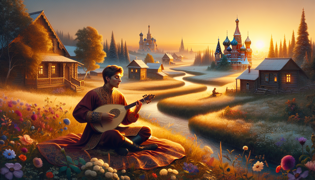
The Call of War
As the seasons changed and years passed, the gentle rhythms of village life were shattered by the distant roar of unfathomable conflict. The comfort of the familiar was replaced with a chilling apprehension. Rumors began to circulate like an unruly wind: a brutal army had emerged from the eastern steppes, claiming dominion over the neighboring lands and forcing unwelcome strangers into bondage. The fiery eyes of conquerors burned with ruthless determination, and their war drums echoed through the heart of the countryside.
One early autumn day, as the leaves had just begun to turn a coppery red, news of the invading force reached the village. With a palpable air of trepidation, the villagers gathered in the central square, faces etched with worry and eyes searching the horizon for answers. Ilya, who had long believed in the unassailable power of beauty and music, now found himself at the crossroads of hope and despair. The clash of metal against metal, and the anguished cries over the fields, heralded a departure from the simple cadence of peaceful life.
In the midst of this turmoil, the lute player’s heart pounded not only with fear but also with a burgeoning resolve. His music, which had once been a serene murmur, took on a more urgent and plaintive tone. Every note he played was burdened with the knowledge of what was to come—a silent plea for the lost souls and a rallying cry for those brave enough to resist. As armies advanced, the picturesque landscape of the village was marred by scorch marks and torn banners. The once harmonious chatter of the wind and birds now merged with the resounding clamor of distant battle cries.
Ilya watched in dismay as his friends, neighbors, and family were swept up in the tide of violence and coercion. The invaders, clad in dark, imposing uniforms, arrested the village’s resilient spirit with ruthless efficiency. People were herded like cattle; the once vibrant streets were transformed into corridors of despair. Yet, even as the iron grip of tyranny began to spread, Ilya’s melodies refused to surrender to silence. In his heart, the music held a secret power—a promise of resistance that could not be quenched by force.
On that fateful day, under a sky partially veiled by the smoke of burning homes, Ilya clutched his lute as if it were a talisman. Deep within, it resonated with the timeless energy of his ancestors, a legacy of hope amid ruin. In the mournful strains that escaped his lips, there lay an incantation for renewal, a defiant act against the encroaching night. Every note was a soothing balm for the wounded hearts of his people—a reminder that even in darkness, a spark of light could ignite the flames of revolution.
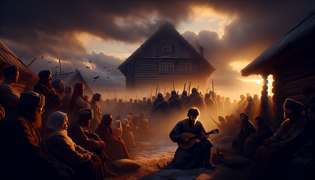
Chains and Chords
In the wake of the invasion, turmoil reigned with the arrival of tyranny and the shattering of freedom. Ilya, among many, was captured during a sudden raid on the village. Dragged away from the place that had nurtured his dreams, he found himself in the cold, unforgiving corridors of a labor camp far removed from his homeland’s gentle embrace. The days blended into nights in this grim existence, where the clanging of iron bars replaced the sweet rustle of birch trees and the laughter of children.
Within the confines of his new prison, Ilya’s spirit was tested beyond measure. The captors sought to suppress every spark of individuality, and music—once his greatest ally—became a forbidden luxury. Yet, even as the grim walls closed in and hope seemed to dwindle, his inner voice refused to be silenced. In the bleak hours of dawn, when the world was painted in melancholic grays rather than its once vibrant palette, Ilya would gently caress the hidden strings of his clandestine lute.
The soft notes that emerged in the solitude of the night were secret odes to resilience. They wove through the damp corridors and echoed in the hearts of fellow prisoners who, burdened by their own sorrows, dared to dream of liberation. In whispered corners of the labor camp, tales began to circulate about the mysterious musician whose melodies could soften even the hardest of hearts. His music became a clandestine language—a quiet rebellion against the oppressive might of his captors.
Amid long, laborious days under the iron rule, Ilya forged a bond with other enslaved souls. Together, sharing stolen moments of whispered conversation and fleeting smiles, they discovered that the power of art can transcend the darkest of circumstances. They gathered in secret, huddled in shadows where the faint glow of a makeshift candle was enough to kindle hope. With every chord, Ilya not only recounted the pain of lost freedom but also instilled a quiet strength—a promise that even the cruelest chains could not bind the chord of human spirit.
This secret symphony, composed under duress, began to evolve. As the notes mingled with the raw emotions of suffering and despair, they slowly morphed into an anthem of defiance. For every prisoner who listened, the music was a reminder that the heart—like a resilient lute—could be mended and made to sing again. In that desolate place of confinement, Ilya’s art was not merely an escape from reality; it was an act of courageous resistance that wove together the frayed hopes of many. The haunting, yet empowering, chords became a symbol for all who believed that the darkest moments could one day give way to a new dawn.
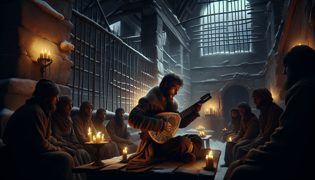
Whispers of Rebellion
As the seasons turned once more, the murmurs of defiance began to swell beyond the confines of the labor camp. Ilya’s clandestine performances, whispered about in hushed tones among the prisoners, reached the ears of a daring group of rebels who had long plotted to overthrow the oppressive regime. In secret meetings held deep within the cavernous recesses of ancient monasteries and hidden groves, plans were hatched and bonds forged. The revolutionary spark was ignited not by brute force alone, but by the transcendent power of a melody that resonated with centuries of hope and struggle.
In these clandestine circles, Ilya’s music took on a new dimension. No longer was it merely a personal solace or a forbidden indulgence—it had become a rallying cry for liberation. The rebels, humbled by their own losses yet emboldened by the shared dream of a free people, found in each note a call to rise against tyranny. Through whispered transmissions and secret gatherings under starlit skies, the tale of the lute player evolved into a legend of defiance that bridged disparate souls and ignited the embers of revolution.
In a dimly lit room hidden beneath the crumbling vestiges of an abandoned chapel, Ilya’s battered fingers danced upon the strings one fateful evening. The atmosphere was charged with raw emotion; a fragile yet unyielding hope wove through the gathered rebels as his notes filled the space. His music seemed to thaw the ice of despair that had gripped their hearts for so long. Each chord was a declaration of resistance—a reminder that even in the depths of captivity, human spirit could not be wholly subdued.
For weeks, secret assemblies convened in forgotten, ivy-clad corridors and moonlit clearings, their conversations laced with the promise of revenge and rebirth. While the sound of marching boots and clattering chains echoed in the distance, the rebels nurtured a plan of gradual insurrection. Ilya, once an unassuming musician of the village, now emerged as a symbol of their cause. His performances, interwoven with ancient chants and fervent whispers of freedom, became the unsung anthem of resistance.
In the flickering half-light of these meetings, the rebels discovered that courage blooms in the most unexpected places. They found solace in the knowledge that music—timeless and pure—could unite disparate hearts against a common foe. As the echoes of his lute mingled with the quiet determination of those listening, a collective resolve took shape: a vow that one day, the chains of enslavement would be shattered, and the skies above Russia would once again be filled with the bright, free light of a new dawn.
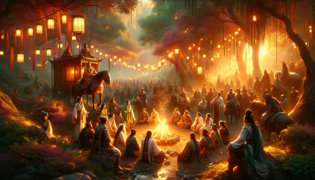
Freedom's Resonance
The day of reckoning had arrived, and as winter’s chill slowly gave way to the hopeful warmth of early spring, the rebels set their plan into motion. The labor camps and oppressive garrisons, once symbols of despair, trembled under the weight of a collective will that refused submission. Armed not only with makeshift weapons and stolen courage but also with the reverberating echoes of Ilya’s transcendent music, the people began to rise.
Under a sky blushing with the soft light of dawn, the sound of clashing steel mingled with the stirring strains of a familiar melody. Ilya, now more than a captive musician, had become an emblem of liberation. As the rebels advanced through frost-laden fields and along winding country roads, his music acted as both a call to arms and a reminder of the beauty that was worth fighting for. The battleground, a once peaceful expanse of snow-dusted plains and birch forests, transformed into an arena where destiny was re-forged.
The battle was fierce and unyielding. Amid the chaos of combat, Ilya’s lute played on—a persistent, soulful hymn that cut through the clamor of war. Every note seemed to defy the cruelty of the enemy, resonating with the spirit of a people who had long been denied their freedom. As the rebels clashed with the forces of oppression, the very earth beneath them appeared to hum in solidarity, the whisper of the wind carrying messages of renewal and the promise of a liberated future.
Through the swirling mists of battle and the echoes of shattered chains, the courage of the people shone like a beacon. Ilya’s music, a constant undercurrent amid confusion and strife, sustained the rebels. It transformed sorrow into strength and despair into determination. His melodies soared over the din of combat—an anthem that celebrated not only the liberation of their bodies but also the revival of their souls. With each passing moment, the oppressive force began to falter under the weight of unity and resilience.
When the final cry of battle subsided and the once oppressive fortress lay silent under a sky of radiant blue, the rebels gathered as one. In that moment of triumph, the scars of war and the memory of lost kin were honored by the gentle strains of the lute. Ilya’s eyes, filled with both the pain of the past and the hope of a future yet untold, shone brightly as he performed one last, soulful cadence. His music had transcended the boundaries of mere sound; it had become a language of liberation, echoing through the newly freed lands and promising that the spirit of the people would endure, no matter the trials ahead.
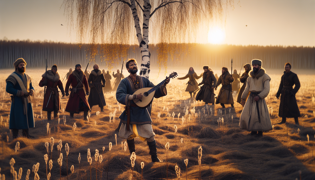
Conclusion
In the aftermath of the battle, as the echoes of clashing swords faded into the gentle rustle of rejuvenating winds, the land began to heal. The scars of war, though deep, were softened by the tender promise of renewal. Villages that had once been shrouded in despair gradually blossomed with the vibrant hues of hope. Ilya’s legacy, much like the enduring reverberations of his lute, became a timeless reminder that even in the face of unimaginable darkness, the light of culture, resilience, and unity can prevail.
Community meetings replaced the anguished cries of conflict, and the sorrowful ruins of yesterday were reborn into celebrations of life and togetherness. The struggles and sacrifices that once defined a generation slowly wove themselves into the rich tapestry of folklore and song, passed on through countless retellings around crackling fires. Ilya, now a free man among a liberated people, continued to carry his cherished lute—not as an instrument of hidden rebellion, but as a beacon of their collective journey toward healing.
In quiet moments under the gentle gaze of a rejuvenated sun, he would travel from one restored village to another, sharing both his music and the story of a people who had dared to dream of freedom. His notes, imbued with the memories of hardship and the sweetness of redemption, resonated across fields and forests alike. They served as both a tribute to those who had fallen and a promise to future generations: that the spirit of the human heart, unbound by any chain, would always find a way to sing.
At last, as the land embraced a new dawn of peace and the scars of former battles faded into the annals of history, the tale of the lute player became legend. It was recounted not with bitterness, but with reverence for the resilience inherent in every human soul. And long after the last note had been played, the timeless echoes of his music continued to inspire those who believed in the transformative power of hope—forever a symbol of liberation, unity, and the indomitable spirit of life.

















